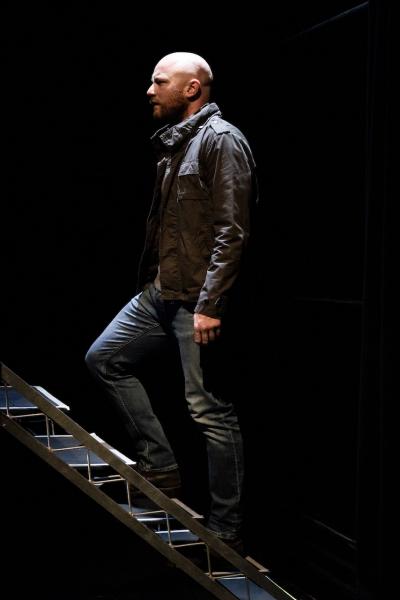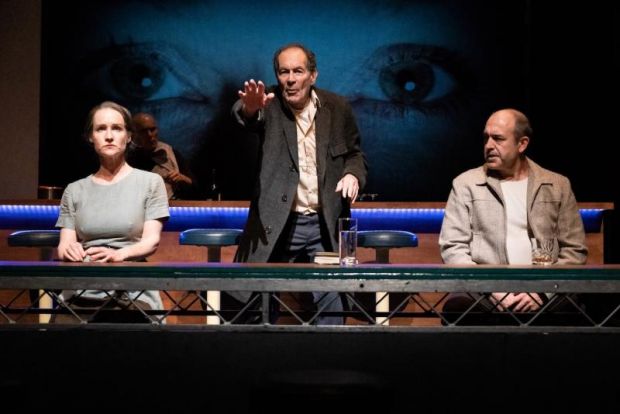The Darkening Sky
You walk into the theatre for this show, and the main set, half lit, waiting, redolent with possibility, immediately reminds you of Edward Hopper’s ‘Night Hawks’. Or it did me. It’s not a copy. Eloise Kent’s set design just suggests or is reminiscent of that lonely image. Like so much in Richard Murphet’s noir-ish play, it’s allusive, it stirs reminders, memories, and associations of the hundreds of black and white film noir movies we’ve seen. The lights go down. The expressionless Barman (Tony Reck) sets up. He never speaks; he knows what his regulars want – always has.
Richard Murphet has a fascination for noir – and pulp fiction. He even put together two clever, witty one act plays – Quick Death and Slow Love – back in 2015, sending up the tropes of both. The Darkening Sky takes those tropes and uses them for more serious purpose. It’s disconcerting at first to realise that this complex tale is set in inner Melbourne, on very specific streets and train stations, but why not? It brings the story in close and makes it somehow more real.
We see iconic images on the big screen behind the bar: the sea – no land, no horizon, swelling ominously; later, a woman’s face in close-up, wreathed in cigarette smoke; a tight shot of vital information changing hands; a blood-smeared car interior… Adrian Montana, live on stage, supplies mood music: the tinkle of a bar piano, ominous chords as someone ascends some stairs…

James (Brian Lipson), a rumpled, nervous man in an overcoat, tells us his story. His mother disappeared when he was eight or nine… His search for his mother, Heather (Edwina Wren) is the framing device, our story in the present. But James’ fragmented and unreliable memories give us three time frames. There is Little Jamie (James aged eight or nine, played or remembered by adult James) and there’s Young Jamie (Matthew Connell), aged 17 or eighteen. Young Jamie falls hard for sexy Chantal St Clair (Rebekah Hill). She’s in danger, but she never quite explains why. We realise that we will have to pay close attention to make sense of all this.
Back in the present, PI Tony (Tom Dent) is commissioned by his boss Phyllis (Anthea Davis) to find a woman called… Chantal St Clair, who disappeared. Phyllis can’t or won’t say who wants to know. Tom starts his frustrating hunt, filled with red herrings and dead ends – but maybe, possibly, Guy Burroughs (Mark Tregonning) is the man who wants to know… Tom takes notes. As he says, his notes are ‘data, and data becomes information, and information becomes… What? Does it become knowledge? Or recede into the unknowable?
So, in the noir genre tradition there’s a femme fatale – but here there are two, Heather and Chantal, searched for by an anguished James and, in the past, a bewildered Young Jamie – a couple of chumps. Of course, PI Tony is also searching for Chantal, but that’s a non-genre pointed variation on James’ search. For the jeopardy usually supplied by crime in this genre, Murphet employs the politics of a secret, futile but dangerous fringe group, where suddenly one becomes a traitor, or knows too much. Thus, a mother and son are separated, a boy loses his lover.

Murphet’s challenge is to keep us with him – and with James - and it’s not always easy. There are a lot of characters and names to remember as we slide between those times frames that sometimes intersect as well. Fortunately, Murphet is a skilled director, and he moves his cast briskly around the streets, the bar, the detective agency, a walk-up apartment cum office, all giving us those reminiscent images. Some cast double up: Mark Tregonning also plays Ray, James’ father; Adam Pierzchalski is Heather’s ‘friend’, and a teacher, and a trumpet player, and maybe a killer. Anthea Davis plays Maddie Carson, probably an assassin, as well as Phyllis, Tony’s boss. But these and other roles are perfectly distinguished, helping us to follow the threads and keep up.
This is not a play that makes perfect sense on the way through. It’s hard work but in the end rewarding. It’s often frustrating, bewildering and, yes, has some longueurs. But it is a play you chew over, unravel, and reassemble later, on the way home. The Companion was very helpful. Then you see how the strands are thematically linked, how memory is unreliable, and dead ends are in the nature of things, and how Murphet has used the genre tropes but in his own way.
The Darkening Sky finally reaches us after two COVID lockdown cancellations. The work and commitment of cast and ‘creatives’ to this intricate show is a tribute to them and to its creator.
Michael Brindley
Photographer: Chelsea Neate
Subscribe to our E-Newsletter, buy our latest print edition or find a Performing Arts book at Book Nook.

